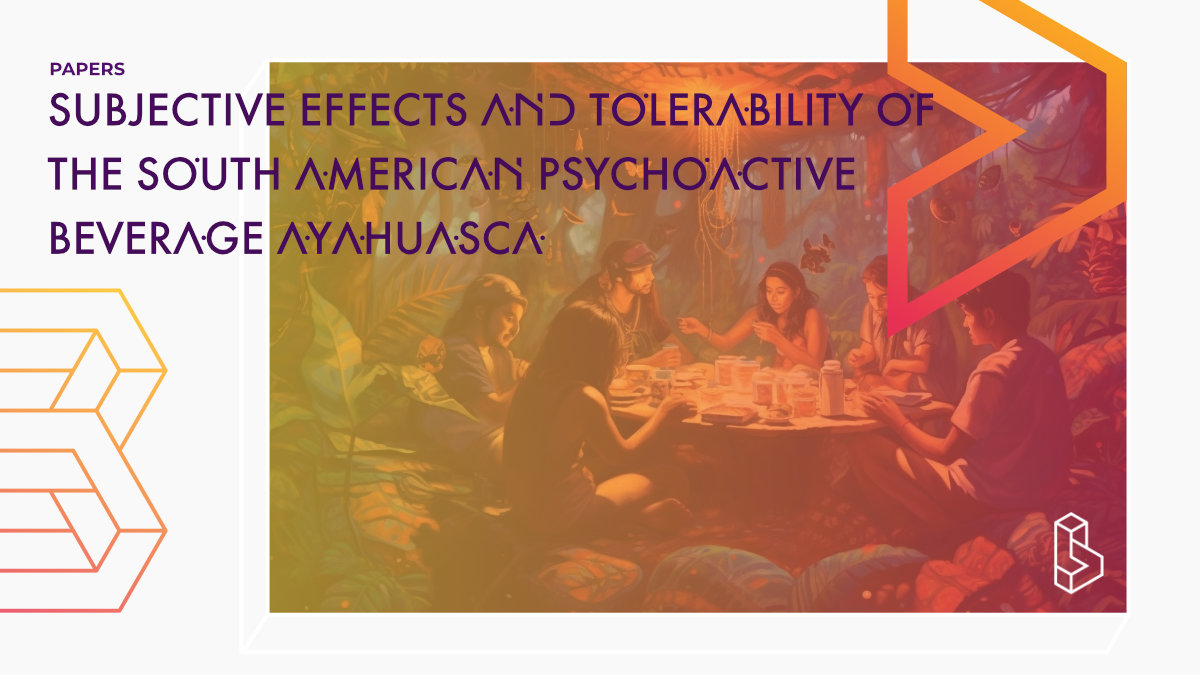This single-blind, placebo-controlled, crossover study (n=6) assessed the psychological effects and tolerability of ayahuasca (35, 52.5, 75mg DMT/70kg) in healthy male volunteers with prior experience. The study found dose-dependent increases in various psychological effects, with the tea being well-tolerated from a cardiovascular perspective, though modified physical sensations and nausea were the most frequently reported somatic-dysphoric effects. Ayahuasca induced changes in perceptual, affective, cognitive, and somatic spheres, with stimulatory and visual psychoactive effects of longer duration and milder intensity than intravenously administered DMT.
Abstract of Subjective effects and tolerability of the South American psychoactive beverage Ayahuasca
“Rationale: Ayahuasca is a South American psychoactive beverage that contains the naturally occurring psychedelic agent N,N-dimethyltryptamine (DMT). This “tea” has been used for centuries in religious and medicinal contexts in the rain forest areas of South America and is presently gaining the attention of psychedelic users in North America and Europe.
Objectives: In the present study, the psychological effects and tolerability of ayahuasca were assessed.
Methods: Three increasing doses of encapsulated freeze-dried ayahuasca (0.5, 0.75, and 1.0 mg DMT/kg body weight) were administered to six healthy male volunteers with prior experience in the use of this tea, in a single-blind crossover placebo-controlled clinical trial.
Results: Ayahuasca produced significant dose-dependent increases in five of the six subscales of the Hallucinogen Rating Scale, in the LSD, MBG, and A scales of the Addiction Research Center Inventory, and in the “liking”, “good effects” and “high” visual analogue scales. Psychological effects were first noted after 30–60 min, peaked between 60–120 min, and were resolved by 240 min. The tea was well tolerated from a cardiovascular point of view, with a trend toward increase for systolic blood pressure. Modified physical sensations and nausea were the most frequently reported somatic-dysphoric effects. The overall experience was regarded as pleasant and satisfactory by five of the six volunteers, while one volunteer experienced an intensely dysphoric reaction with transient disorientation and anxiety at the medium dose and voluntarily withdrew from the study.
Conclusions: Ayahuasca can be described as inducing changes in the perceptual, affective, cognitive, and somatic spheres, with a combination of stimulatory and visual psychoactive effects of longer duration and milder intensity than those previously reported for intravenously administered DMT.
Authors: Jordi Riba, Antoni Rodríguez-Fornells, Gloria Urbano, Adelaida Morte, Rosa Antonijoan, Maria Montero, James C. Callaway & Manel J. Barbanoj
Summary of Subjective effects and tolerability of the South American psychoactive beverage Ayahuasca
Ayahuasca, a psychoactive tea from the Amazon and Orinoco river basins, is becoming increasingly popular in Europe and North America as a sacramental drug. Its use has raised concerns for public health, and extensive clinical data are indicated on its bodily, psychological, and neurophysiological effects.
Ayahuasca is obtained by infusing the shredded stalk of the malpighiaceous vine Banisteriopsis caapi with the leaves of Psychotria viridis or Diplopterys cabrerana. These plants are rich in the psychedelic indole DMT.
Find this paper
https://doi.org/10.1007/s002130000606
Paywall | Google Scholar | Backup | 🕊
Cite this paper (APA)
Riba, J., Rodríguez-Fornells, A., Urbano, G., Morte, A., Antonijoan, R., Montero, M., ... & Barbanoj, M. J. (2001). Subjective effects and tolerability of the South American psychoactive beverage Ayahuasca in healthy volunteers. Psychopharmacology, 154, 85-95.
Study details
Compounds studied
Ayahuasca
Topics studied
Healthy Subjects
Study characteristics
Original
Single-Blind
Within-Subject
Participants
6
Humans
Authors
Authors associated with this publication with profiles on Blossom
Jordi RibaJordi Riba (1968 - 2020†) was a pioneering ayahuasca researcher who dedicated over two decades of work to the field. His work focussed on the pharmacokinetics and pharmacodynamics of ayahuasca, including alkaloid disposition, and electroencephalography, and neuroimaging measures of acute ayahuasca effects. He also conducted several studies on centrally-acting drugs on the acute and long-term effects of psychedelics, psychostimulants, cannabinoids, sedatives, and kappa-opioid receptor agonists. His later work moved towards investigating the neural and psychological mechanisms that could underlie the beneficial effects of ayahuasca in the treatment of various psychiatric conditions.
Institutes
Institutes associated with this publication
Hospital de Sant PauThis research institute is linked to a study but doesn't have a full profile yet.
Compound Details
The psychedelics given at which dose and how many times
Ayahuasca 35 - 70mg | 1x

